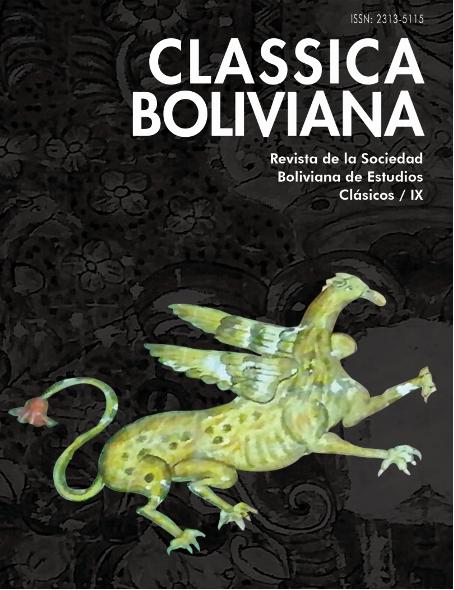Mostrar el registro sencillo del ítem
dc.contributor.author
Meynet, Beatriz Carina

dc.date.available
2020-10-09T20:34:22Z
dc.date.issued
2019-04
dc.identifier.citation
Meynet, Beatriz Carina; ¿Aprender es agarrar? Metáfora etimológica y estructura léxica en el término aprendizaje; Sociedad Boliviana de Estudios Clásicos; Classica Boliviana; IX; 4-2019; 49-88
dc.identifier.issn
2313-5115
dc.identifier.uri
http://hdl.handle.net/11336/115704
dc.description.abstract
Como es sabido, la etimología del verbo aprender se remonta al verbo latino apprehendo, cuyo significado, sin embargo, no era propiamente ‘aprender’. De hecho, hasta bien entrada la Edad Media, el verbo siguió designando la acción de ‘agarrar’ tanto en su sentido concreto como abstracto de ‘comprender’, pero no como sinónimo de disco (‘aprender’). Por lo tanto, resulta interesante preguntarse no sólo por qué pudo haber adquirido ese sentido específico, desterrando a disco en sus resultados romances, sino cómo incluso llegó a formar parte del léxico específico del registro de las Ciencias de la Educación. Asimismo, cabe preguntarse si tanto desde un punto de vista lexemático como disciplinar (Pedagogía, Psicología, Filosofía, Lingüística) pervive de alguna manera la metáfora etimológica presente en el término. Es el objetivo de este trabajo intentar dar respuesta a estas preguntas centrándonos en el derivado nominal abstracto aprendizaje. Para ello recurriremos a conceptos propios de diversas vertientes lingüísticas, como motivación etimológica, metáfora conceptual, registro y estructura léxica. Intentaremos observar de qué manera opera la metáfora etimológica subyacente al término en relación con los diversos usos que experimentó a través del tiempo, y cómo puede entenderse su estructura semántica en función de ello.
dc.description.abstract
As it is known, the etymology of the verb aprender (‘to learn’) can be traced back to the Latin verb apprehendo, which did not properly mean ‘to learn’. In fact, until well into the Middle Ages, the verb continued to designate the action of ‘to grasp’ both in its concrete and abstract sense of ‘to understand’, but not as a synonym of disco (‘to learn’). Therefore, it is interesting to ask not only why the verb could have acquired that specific meaning, banishing disco from the Romance languages, but also how it became part of the specific lexicon of Learning Sciences’s register. Likewise, it is worth asking whether, from both a lexical and disciplinary (pedagogy, psychology, philosophy, linguistics) point of view, the etymological metaphor present in the term survives in some way. It is the aim of this paper to try to answer these questions by focusing on the abstract noun aprendizaje (‘learning’). With this purpose, we will resort to concepts of different linguistic theories, such as etymological motivation, conceptual metaphor, register and lexical structure. We will try to observe how the etymological metaphor underlying the term works in relation to the various uses it has experienced over time, and how its semantic structure can be accordingly understood.
dc.format
application/pdf
dc.language.iso
spa
dc.publisher
Sociedad Boliviana de Estudios Clásicos
dc.rights
info:eu-repo/semantics/openAccess
dc.rights.uri
https://creativecommons.org/licenses/by-nc-sa/2.5/ar/
dc.subject
APRENDIZAJE
dc.subject
METÁFORA ETIMOLÓGICA
dc.subject
REGISTRO
dc.subject
ESTRUCTURA LÉXICA
dc.subject.classification
Otras Lengua y Literatura

dc.subject.classification
Lengua y Literatura

dc.subject.classification
HUMANIDADES

dc.title
¿Aprender es agarrar? Metáfora etimológica y estructura léxica en el término aprendizaje
dc.type
info:eu-repo/semantics/article
dc.type
info:ar-repo/semantics/artículo
dc.type
info:eu-repo/semantics/publishedVersion
dc.date.updated
2020-05-14T15:54:22Z
dc.journal.volume
IX
dc.journal.pagination
49-88
dc.journal.pais
Bolivia

dc.journal.ciudad
La Paz
dc.description.fil
Fil: Meynet, Beatriz Carina. Consejo Nacional de Investigaciones Científicas y Técnicas. Centro Científico Tecnológico Conicet - Córdoba. Centro de Investigaciones y Estudios sobre Cultura y Sociedad. Universidad Nacional de Córdoba. Centro de Investigaciones y Estudios sobre Cultura y Sociedad; Argentina. Universidad Nacional de Córdoba. Facultad de Lenguas; Argentina
dc.journal.title
Classica Boliviana
dc.relation.alternativeid
info:eu-repo/semantics/altIdentifier/url/http://www.estudiosclasicosbolivia.org/spip.php?article85
Archivos asociados
